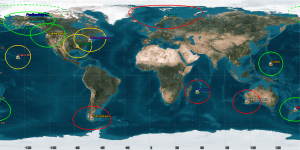Latest News
[Via Satellite 07-31-2014] Spaceflight Inc. is expanding its business from focusing primarily on rideshare opportunities for small satellites to include a ground network branch. Officially named Spaceflight Networks, the new branch will provide satellite communications through a global series of ground stations.
The company expects the first of 12 stations to go online during the first quarter of 2015. Speaking to Via Satellite, Spaceflight President Curt Blake said ground stations became an apparent market opportunity in addition to ridesharing almost immediately after the company was founded.
“We historically have bought excess capacity on launch vehicles and then aggregated and integrated payloads onto the launch vehicle. What we found in our travels is that, after launch, the second most asked question is ‘how are we going to communicate with our satellite once it’s up there?’ After hearing this a great number of times, we decided that it was an opportunity we could certainly address, and it was a great co-selling opportunity as well,” he said.
Spaceflight has built a name for itself by assisting small satellite operators with getting their spacecraft launched. Often, these small payloads are stashed away where there is extra space on larger missions. Spaceflight has assisted Planet Labs in launching dozens of small satellites to the International Space Station (ISS) for deployment by NanoRacks, along with other payloads.
Blake said one of the problems faced by Spaceflight’s customers is that a majority of the existing ground station infrastructure is very customized. This can make staying in contact with a spacecraft, or multiple spacecraft, prohibitively expensive for the entrepreneurial space companies that frequently make use of small satellites.
“You can build a satellite much cheaper, you can get it launched much cheaper, but still the communications costs are high, or at least proportionally high to what we think they ought to be,” explained Blake. “That’s what we are trying to solve for.”
The Spaceflight Networks series of ground stations is targeted toward emerging constellations that do not need heavily customized gateways. This, according to Blake, will help bring the cost of maintaining a large constellation for small players in line with the smaller costs for building and launching.
The number of companies planning “big” small satellite constellations has grown rapidly in recent years. Planet Labs intends to build a constellation of more than 100 satellites in 12 months time. Satellogic, another Earth imaging startup, has plans for a constellation that could number a few hundred. Other new announcements include Dauria Aerospace and Elecnor Deimos’ partnership on a global constellation, and OmniEarth, a joint venture between Harris Corporation, Dynetics and Draper Laboratory, for which Spaceflight is also a rideshare partner.
Blake said that the new company branch already has its first customer for ground communications services. Although it remained unnamed, he said it will be a heavy user of the network, making it essentially Spaceflight Networks’ anchor tenant.
Another step Spaceflight Networks is taking to reduce costs is limiting the number of radios used and offering options that are software defined. The company is working with a number of spacecraft radio providers, encouraging the use of modern IP protocols to further minimize the level of customization.
Spaceflight Network’s ground sites will be optimized for satellites in Low Earth Orbit (LEO). The company conducted an initial study to identify future sites, which include Guam, Mauritius and Norway. The first station is set for construction in Washington, and the rest are to follow during the next few years.
“We are pushing forward the international and the longer lead sites,” said John Springmann, systems engineer, Spaceflight. “We’re setting up groundwork now, but it will take a year or two to be developed. That is what drives the 2015, 2016 and 2017 schedule.”
Springmann said other sites will take slightly longer to complete because the regulatory policies vary per country. Spaceflight Networks undisclosed anchor tenant is also influencing the build-out, he said.
Get the latest Via Satellite news!
Subscribe Now